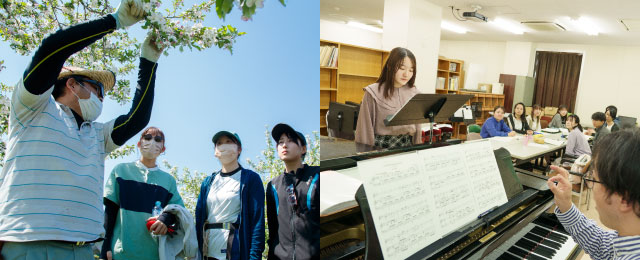







Home > Faculties and Schools > Diploma and Curriculum Policies (Undergraduate) > Diploma and Curriculum Policies of the Faculty of Literature and Social Sciences
The Faculty of Literature and Social Sciences develops people with wide culture and rich humanity as well as high communication skills and a wide perspective who can address various problems of modern society and local communities.
The holder of a bachelor's degree from the faculty:
For students to acquire these abilities, the Faculty of Literature and Social Sciences compiles its curriculum on the basis of the following policy:
The Department of Human Sciences and Cultural Studies offers 12 specialties covering most of the human sciences and cultural fields in two educational courses: Cultural Systems and Social System. Students belong to one of the 12 specialty courses, study specified disciplines, compile their academic results in a baccalaureate thesis and receive a bachelor's degree in literature. In conferring a bachelor's degree, the department emphasizes the following points in order to ascertain if baccalaureate candidates have acquired knowledge and skills appropriate for bachelors:
The curriculum of the Department of Law, Economics and Public Policy consists of the three courses of Law, Economics and Business Management, and Public Policy. It aims at cultivating in students the ability to address various problems facing modern society through studying of law, economics, business administration and other social sciences for deeper expertise.
The course develops students' advanced judgment and problem solving ability to suitably and flexibly deal with varied legal issues by finding problems arising from various phenomena of modern society and examining them from a legal point of view in the light of their political, social and historical backgrounds. Students also foster the ability to tackle public issues in the future through voluntary participation in society as sensible and responsible members of society.
The course confers a bachelor's degree in law on students who have acquired prescribed academic credits upon achieving the following results:
In the fields of public law, criminal law and civil law in specialty education, students first study introductory subjects for the basic theory of law. On top of such basic knowledge, students study evolving subjects in respective fields to acquire legal knowledge based on the systematicity of law. They also study the historical and social backgrounds of law and the theory of law from various subjects to obtain wide culture and expertise that can be applied in a variety of situations. They can also take politics, economics and business administration subjects. Further, they belong to a seminar in the field of their interest to seek on their own how to solve varying legal problems of society through the collection and analysis of literature and discussions with teachers and other students and cultivate the ability to organize own views and convey them logically.
In this course, students study economics, business administration, economic policy and their history and present situations. The objective of the course is to develop people who have the ability to weigh multiple solutions to economic, managerial and policy issues facing modern society, an insight into the direction of problem solving and the policymaking capability.
The course awards a bachelor's degree in economics to students who have obtained the prescribed credits upon accomplishing the following academic results:
Students acquire basic knowledge and the way of thinking by studying basic specialty subjects in economics and business administration. They further study applied specialty subjects to cultivate the ability to understand real-life economic and business management phenomena and basic skills for problem solving. From the third year onward, they select a specialty seminar of their interest, learn further advanced expertise through small-group education and acquire the ability to find and analyze problems logically and convey the result accurately. Students can also take law and politics subjects. Through such learning, they develop problem solving skills and the abilities to logically consider and discuss economic, business administrative and policy issues facing modern society on the basis of the basic knowledge of social sciences centering on economics and business management.
Public Policy is an academic field to deal with how society should address and solve its problems. Students study basic social science subjects like law, politics, economics and business administration in a well-balanced manner and cultivate the ability to understand and analyze modern society's various problems from a public point of view on the basis of wide knowledge of social sciences. The course also aims at fostering people who can tackle problems of local communities through practical activities.
The course confers a bachelor's degree in policy science on students who have acquired the prescribed credits upon accomplishing the following academic results:
By studying core subjects of law, politics, economics and business administration, students obtain basic knowledge and the way of thinking. They then take evolving subjects to acquire expertise necessary for finding problems and considering solutions. From the third year onward, they belong to a seminar of their interested field to develop logical thinking, communication skills and the ability to find various problems of society from a public point of view. They can also join a seminar whose students participate in community development and activities and a lecture that discusses the current situation and problems of communities and community administration. Through such education, students cultivate the practical ability to address problems by considering the actual situation of society to contribute to it voluntarily.